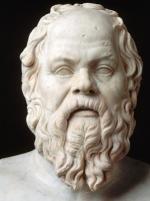|
This section contains 858 words (approx. 3 pages at 300 words per page) |

|
Socrates and the Sophists
Summary: Describes the sophist philosophy. Contrasts it to the views of ancient Greek philosopher Socrates. Focuses on the varying views on absolute truth.
How would you feel if someone called you a sophist? Before you answer, it's important to know how the meaning of this word has evolved. "During the fifth century, sophists were teachers, speakers, and philosophers who were paid to use rhetoric (Mardner 1)." But many people opposed their style of teaching. Socrates was a philosopher who disagreed with the Sophist's point-of-view. The main differences between the Sophist and Socrates were their views on absolute truth.
"The sophist believed that there was no absolute truth and that truth was what one believed it to be (Porter 1)." Sophists were not teachers of truth but teachers of thought. Their students were expected to be able to argue both sides of a debate but were not required to take a stand on a subject. "Sophists concluded that there is no absolute proof of anything and that language counts for nothing (Gibson 285)." Sophist teachers...
|
This section contains 858 words (approx. 3 pages at 300 words per page) |

|


